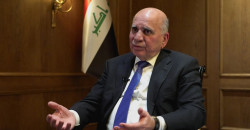US policy shift: Trump ends 45-year sanctions on Syria

Shafaq News/ In a sweeping reversal of long-standing US policy, US President Donald Trump has announced the lifting of sanctions on Syria, ending nearly 45 years of economic restrictions.
The move followed a high-level meeting in Riyadh with Syrian transitional President Ahmad al-Sharaa and Saudi Crown Prince Mohammed bin Salman. Trump framed the decision as a milestone for Syria’s future, calling al-Sharaa “a strong leader capable of guiding the country into a new era.”
US sanctions on Syria date back to 1979, when the country was first labeled a “state sponsor of terrorism.” Over the decades, measures expanded significantly, most notably under the 2004 Syria Accountability Act and again after the 2011 civil war. Sanctions then targeted former President Bashar al-Assad, his family, and key sectors of the Syrian economy.
The most stringent measures were reportedly introduced in 2020 with the Caesar Syria Civilian Protection Act, which barred US support for reconstruction efforts and imposed heavy penalties on entities doing business with the al-Assad regime. It extended to former First Lady Asma al-Assad, freezing assets and effectively discouraging global investment.
While humanitarian carveouts existed, the cumulative impact of the sanctions decimated Syria’s economy, restricting access to vital goods and halting infrastructure recovery.
According to legal analysts, US sanctions fall into two categories: executive orders, which the president can revoke, and legislative measures, such as the Caesar Act, that require Congressional approval to amend or repeal. Thus, Trump’s recent move lifts executive-level restrictions; the future of legislated sanctions remains in the hands of lawmakers.
This shift in policy follows the December 2024 collapse of the al-Assad regime and the formation of a transitional government, which has pushed for sanctions relief as a foundation for rebuilding.
Economists and regional experts have largely welcomed the move. “Sanctions relief will unlock access to essential imports—from medical equipment to construction materials,” one analyst noted. “It also opens the door for foreign investment and the restoration of basic services like healthcare, education, and transportation.”
The US step comes amid broader regional realignments, with Gulf states and international actors recalibrating their stance on Syria after years of conflict and isolation.





